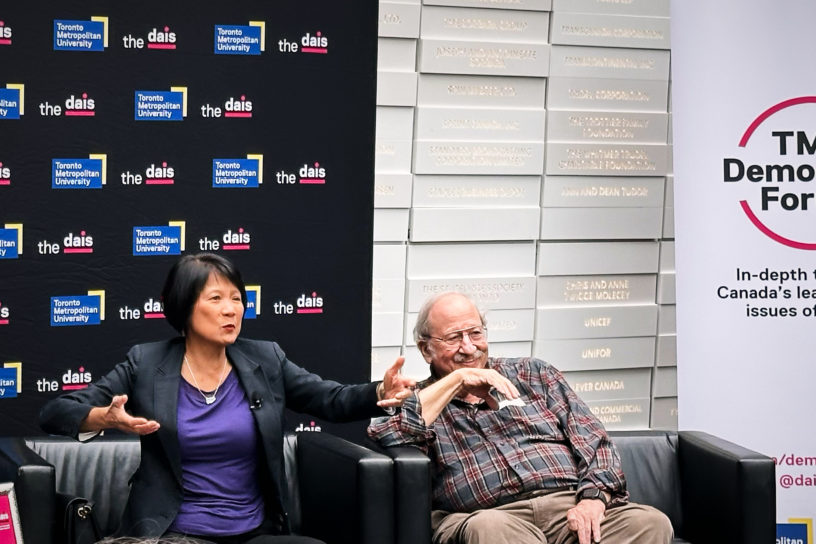By James Novo
Toronto Metropolitan University (TMU) hosted its 34th democracy forum on Friday with Toronto Mayor Olivia Chow and Harvard professor of leadership, organizing and civil society Marshall Ganz.
The forum was hosted in the George Vari Engineering and Computer Centre’s Sears Atrium by The Dais, a public policy and leadership think tank at TMU according to their website. The forum focused on creating lasting change in democracy by making connections within the community.
Martin Regg Cohn, a Toronto Star columnist and founder of the democracy forum moderated the talk. The event was intended to touch on Ganz’s recently released book, People, Power, Change: Organizing for Democratic Renewal. However, the focus shifted to discussing how to make lasting change in a democracy.
Cohn began the discussion by asking Chow to discuss her relationship with Ganz and to speak on how he has influenced her political career as a long-time friend and mentor. Chow said Ganz was able to help her throughout her career, especially after losing the mayoral election in 2014 and the member of parliament election in Spadina Fort-York in 2015.
“I lost the election. What am I going to do next? So I called up [Ganz] and said, ‘Hey, what do I do now?’ He said, ‘Well, the best teacher is through failure,'” said Chow.
After her second loss in 2015, Chow became a visiting professor at TMU. She had a previous career in education, teaching English as a Second Language straight out of university and then becoming the Toronto District School Board Trustee in 1985 for six years.
In her return to teaching, Chow realized the way to connect with people was through organizing and storytelling. She said she learned how to connect to people and tell her own story in 2023 which she believed propelled her to winning the mayoral election that year.
Ganz said campaigning for an election shouldn’t be about winning or losing the race, but rather learning valuable experiences. He said the most meaningful part of the process should be coming out of an election “stronger than when you went into it.”
Chow discussed how organizing in politics can only be achieved if genuine connections are made with the citizens she is serving. She emphasized this connection with the people who are putting their trust in their leader and tries to maintain this while in office.
“You can have all the facts in the world and win an argument [but if] you don’t touch the heart, the hands won’t come out,” said Chow.
She said this was the best way to get people to come out and vote, work and volunteer for her when she was campaigning for mayor in 2023.
Ganz reiterated Chow’s sentiment and admitted one of the reasons he wrote his new book was because he was seeing a trend of dehumanization within politics. He said people are being represented as numbers and statistics instead of valued community members.
“People get turned into labels and when we have instructions that force us into these utterly individualistic, depersonalized kinds of data points, we begin to lose the human dimension of politics,” said Ganz.
Strong leadership was also a significant topic of conversation in the forum. According to Ganz, there are two types of leadership: leadership with helpers or one that is distributed and collaborative. The latter advances growth and capacity and is what creates change and positive growth, he said.
Cohn then shifted the focus to the upcoming United States (U.S.) presidential election and asked Ganz about his thoughts on the topic.
Ganz highlighted the financial aspect of the U.S. elections. He believes money is where most of the power comes from rather than organizing for people who need political change.
“Money has dehumanized politics in the U.S. especially, it’s not where it comes from, it’s the fact that there is no constraint,” said Ganz.
He also said that money has created a political marketing industry in the U.S. where power is carried through money and people are overlooked, reiterating the importance of creating genuine connections with people.
Local political tensions between Chow and Ontario Premier Doug Ford were also discussed, particularly around Toronto’s bike lanes. The Ontario Ministry of Transportation is introducing Bill 212, which will give the province authority to remove or restrict bike lanes in cities if passed.
In order to deal with her differences with Ford and strive for change, Chow said “if we connect through experience and not always fight each other on opinion, because that’s ideology…then find the common ground…then you can move ahead together.”
The hour-long discussion was followed by a free workshop with Ganz focusing on leadership development.












Leave a Reply